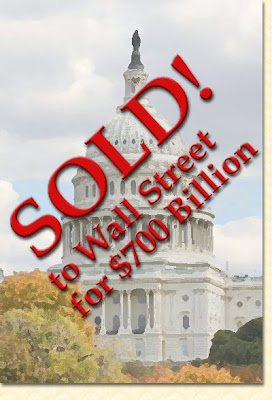Pin the tale on the donkey... and the elephant
These capitalists generally act harmoniously and in concert, to fleece the people.
- Abraham Lincoln
While the media trumpets the passing of this 'historic legislation -- and the taxpaying public, their children, and their grandchildren are left to pay the bill -- here is a little background that McClatchy was kind enough to print:
Lax oversight? Maybe $64 million for D.C. pols explains it
The Wall Street financiers and firms whose problems have prompted a $700 billion federal bailout are no strangers to Capitol Hill or to politics.
Since 2001, eight of the most troubled firms have donated $64.2 million to congressional candidates, presidential candidates and the Republican and Democratic parties, according to data from the nonpartisan Center for Responsive Politics.
The donors include investment bankers Bear Stearns, Goldman Sachs, Lehman Brothers, Merrill Lynch, Morgan Stanley, insurer American International Group and mortgage giants Fannie Mae and Freddie Mac. Since March, with the exception of Goldman Sachs and Morgan Stanley, all of these companies have been bailed out by the government, sold to other companies at deeply discounted prices or simply failed.
Both political parties have become beholden to Wall Street.
Legislators failed in several instances to conduct oversight hearings or to raise concerns as the Bush administration adopted rules that fed the mortgage frenzy and set Wall Street on the route to disaster.
For instance, in 2004 when the Securities and Exchange Commission adopted a major rule change that freed investment banks to plunge tens of billions of dollars in borrowed money into subprime mortgages and other risky plays, congressional banking committees held no oversight hearings.
Congressional inaction also allowed mortgage agents to earn high fees for peddling loans to unqualified homebuyers and prevented states from toughening regulations on predatory lending practices.
Democratic Sen. Christopher Dodd of Connecticut, the chairman of the Senate Banking Committee who ran unsuccessfully for his party's 2008 presidential nomination, has received nearly $1.3 million from employees of the eight troubled firms since 2001.
Dodd didn't respond to repeated requests for comment. His office said he's unaffected by campaign contributions and stressed that he was the first to "sound the alarm about the subprime crisis," shortly after assuming the chairmanship in 2007.
In the House of Representatives, Massachusetts Democrat Barney Frank, has collected about $78,000. Frank, the chairman of the House Financial Services Committee, has taken the least cash of the four House and Senate banking chairmen of recent years.
He said that's probably because he "fought like hell'' against administration limits on state predatory lending laws, but had limited influence until Democrats won the House majority and he became chairman in 2007. He said he'd just become the panel's ranking Democrat in 2004 when the SEC rule was adopted, and "I don't remember that issue coming before us."
Former Ohio Rep. Michael Oxley, who was the Republican chairman of the financial services committee in 2004, when the SEC rule was adopted, received more than $260,000 from the eight banks before he left Congress in 2007. Oxley last year was named vice chairman of the tech-heavy Nasdaq stock exchange. He couldn't be reached for comment.
Sen. Richard Shelby, the Alabama Republican who was the banking committee chairman when the SEC rule was adopted, received more than $152,000 in donations. Jonathan Graffeo, a spokesman for Shelby, said that campaign donations "are not a factor in Sen. Shelby's decision-making."
Shelby said that Democrats blocked his attempts to rein in the roles of mortgage giants Fannie Mae and Freddie Mac and his push for a closer review of the SEC's regulation of investment banks. He said the SEC rule left a staff of fewer than 20 overseeing trillions of dollars in assets.
The Democratic and Republican presidential candidates, Sens. Barack Obama and John McCain, have received a combined total of $3.1 million. A small portion went to their Senate campaigns.
Indeed, it's impossible to say what, if anything, Wall Street bought with its $64 million. Politicians and political parties take money from a wide variety of sources, many of them with competing interests and opinions, but experts interviewed by McClatchy said that inaction by the Congress helped set the stage for the current crisis.
Some state regulators, recognizing early signs of trouble in housing markets, sought help from Congress when the Bush administration adopted rules barring states from enforcing tough laws targeting predatory lending — the practices that were enabling unqualified applicants to obtain subprime mortgages.
With Wall Street serving a key role in buying, bundling and reselling subprime mortgages, state officials couldn't get Congress to intervene, said John Ryan, the executive vice president of the Conference of State Bank Supervisors.
Read the rest...
'Campaign donations' are not a factor in decision-making... please. I see that line over and over in the above story. What a joke. I'm sure the banks always make donations out of kindness and respect, with no strings attached. Perhaps they simply like you guys, shucks.
We've been sold out.
Even the Wall Street Journal - and you have to admit the irony there - ran with the following story:
Bank Lobbyists Regained Clout After Vote in House
WASHINGTON -- After defeat of the financial rescue bill in the House this week, Washington sought advice and ideas from lobbyists of the same industries blamed for creating the mess.
In White House meetings and phone calls Thursday, President George W. Bush and top advisers pleaded with industry groups to help save the $700 billion financial bailout plan, following its defeat Monday in the House of Representatives.
Members of Congress also opened their doors after largely shutting out industry lobbyists earlier.
Read the rest...
I have nothing else to say. Sadly, this was predictable. So is the coming crash of the economy and subsequent collapse of the dollar.
Labels: bailout, Congress, financial crash, financial crisis, government bailout, Wall Street




























































0 Comments:
Post a Comment
<< Home